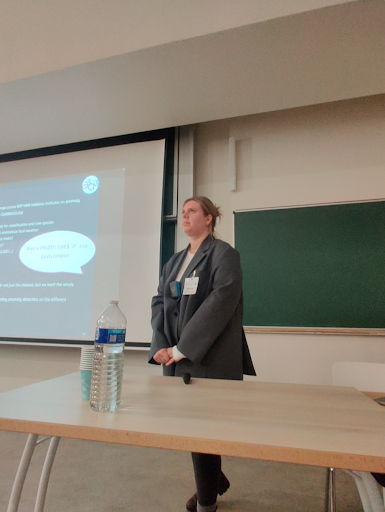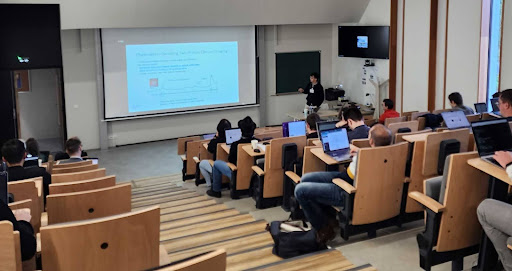AI and the Uncertainty Challenge in Fundamental Physics
By: Katya Govorkova and Yuan-Tang Chou
November 27, 2023
The “AI and the Uncertainty Challenge in Fundamental Physics” workshop was a dynamic experience filled with experts from different areas of applied AI in science. Experts from fundamental science, computer science, and statistics exchange ideas on how to incorporate uncertainty in AI. The workshop took place at the Sorbonne Center for Artificial Intelligence (SCAI) in Paris and at Institut Pascal Université Paris-Saclay in Orsay, France.
Researcher Mark Neubauer (Faculty at the University of Illinois at Urbana-Champaign, A3D3 co-PI) led the discussion in the Uncertainty Quantification session on Tuesday and emphasized the idea of explainable AI.
The session on Wednesday afternoon was specifically dedicated to the FAIR Universe ML challenge, which addresses uncertainties in physics through AI. A3D3, represented by Yuan-Tang Chou (A3D3 Postdoc at the University of Washington) and Katya Govorkova (A3D3 Postdoc at the Massachusetts Institute of Technology), shared valuable insights from organizing an anomaly detection data challenge, emphasizing the necessity of robust frameworks and collaboration. Lessons learned from Katya’s experiences underscored the crucial role challenges play in advancing the field. She also underlined what can be improved in future challenges.

Katya Govorkova presenting Exploring Data Challenges and Leveraging Codabench: A Practical Journey with unsupervised New Physics detection at 40 MHz.
Yuan-Tang highlights another ML challenge example for NSF HDR institute beyond particle physics. The challenge utilized the Neuroscience dataset provided by Prof. Dadarlat’s lab ( Purdue University, A3D3), which tried to decode limb trajectories from neuro activity with ML.

Yuan-Tang presenting ML challenge using Neuroscience dataset
The Codabench platform, noted for its versatility, was highlighted as instrumental in organizing public challenges. The public showed a great interest in hosting and participating in challenges. Challenges were recognized as bridges connecting different disciplines, particularly physics and computer science. The event highlighted those challenges.
The participants provided many great ideas and suggestions during the one-week workshop. Elham E Khoda (Postdoc at the University of Washington, A3D3) gave an excellent summary on the last day to discuss the lesson learned during the week and the next step to improve the HiggsML Uncertainty Challenge. “We definitely want not only people outside the particle physics to join the ML Challenge,” Elham said. “We also encourage participation outside of the domain who can think differently and come up with innovative ideas.”
